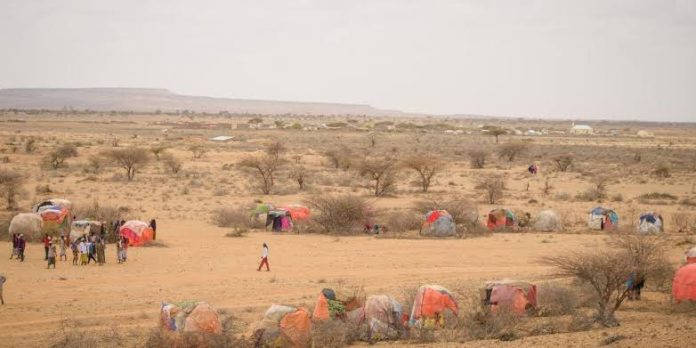Facebook Twitter Instagram Somali Magazine - People's Magazine
A devastating drought in Somaliland’s Awdal region has led to widespread economic collapse, forcing dozens of shops to close as farmers and pastoralists struggle to repay debt. The crisis has left families hungry, children out of school, and local traders on the brink of financial ruin.
Jama Mohamed Hassan, a small business owner in the town of Ruqi, is among those hardest hit. For years, his grocery store served as a lifeline for local families, many of whom purchased food on credit during difficult times. However, as drought conditions worsened, crops failed, and livestock perished, his customers were unable to pay back their debts. Over the past 10 months, Jama has accumulated $6,000 in unpaid credit from around 50 families. With no way to recover these funds, his shop was forced to close, plunging his own family of 17 into crisis.
Now, Jama finds himself in the same desperate situation as his customers—struggling to feed his family. He now relies on credit from wholesalers in Baki district to buy food but can only afford one meal a day. His situation is not unique. Across Awdal, at least 40 small shops have shut down in the past two months due to unpaid debts, leaving communities without access to essential goods.
“The farms are empty. Our lives are in chaos,” Jama lamented. “We used to struggle to get food two out of three times a day. But now, there is just despair, and we can’t even afford one meal a day.”
The economic downturn has affected more than just shop owners. The financial strain has forced Jama to withdraw four of his children from school, as the local high school shut down a month ago due to widespread unpaid tuition fees. Without income from their businesses, parents simply could not afford to keep their children enrolled.
Jama, who has been in business for eight years, now fears he may never recover. Wholesale food suppliers in Borama and Baki have refused to extend him further credit, leaving him without options to restock and reopen.
The crisis has also impacted Abdisalan Mohamed Adan, another shop owner in the region. His once-thriving business, which used to generate a modest daily income of $5-$7, has now collapsed. His family of eight now survives by sharing meals with relatives, uncertain of what the future holds.
At the heart of this crisis is the region’s farming community, which has been decimated by the prolonged drought. Abdinasir Abdillahi Abdi, a local farmer, owes $3,000 in unpaid food and fuel expenses. He had relied on a motorized pump to irrigate his fields after his well dried up, but even with this effort, his crops failed. With no income from farming, he has been unable to repay his debts, making it impossible to purchase more supplies to restart his agricultural work.
“We used to manage the farm, getting some yields every three or four months, allowing life to continue as usual. But now, the town where we used to get supplies, whether it was fuel or household food and goods, has demanded we pay back the debts we have accumulated. As a result, we have been unable to borrow any more to revive our farms,” Abdinasir explained.
With farming no longer an option, Abdinasir has been forced to leave his family behind to work in the gold mines in the Simoodi mountains. He sends his earnings home, hoping that the situation will improve with the arrival of rain. Until then, his family, like many others in Awdal, continues to endure hardship.
Local authorities in Ruqi acknowledge the severity of the crisis, noting that the prolonged drought has devastated the rural economy. Crop failures, mounting debts, and business closures have left many families without a source of income, pushing them toward displacement in search of better opportunities.
As the region waits for relief in the form of rainfall, the people of Awdal remain trapped in a cycle of debt and hunger, struggling to survive in one of the most challenging economic periods in recent memory.

